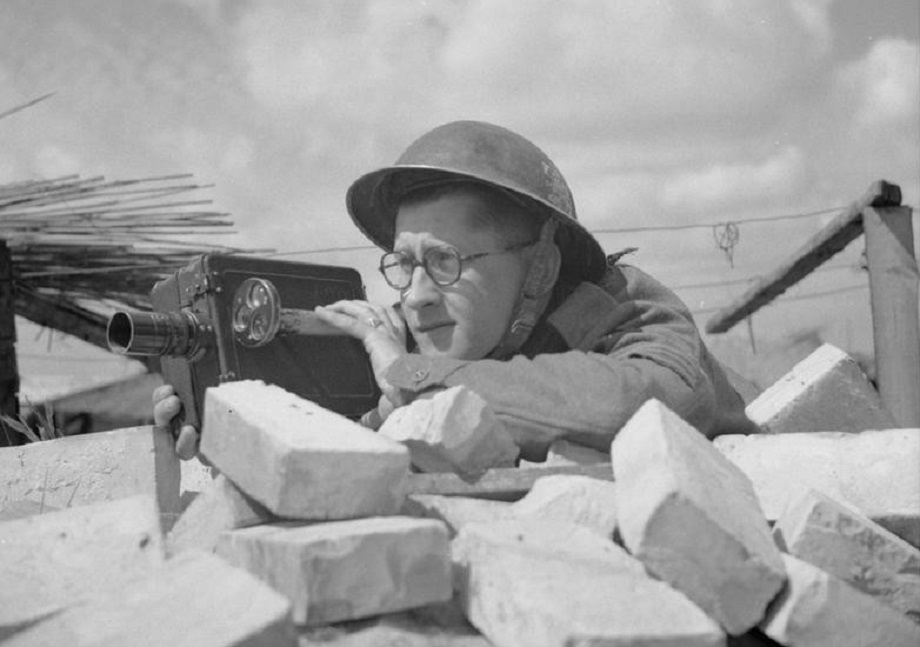Remembering the Second World War Cameramen

L to R: Oliver Carter-Wakefield, Helen Mavin, Helen Upcraft, Hilary Roberts, Paul Clark, Fiona Kelly, Kay Gladstone
Article by IWM film curator Fiona Kelly
On 11 November I was privileged to attend the annual Remembrance service at Pinewood Film Studios. This service is held in memory of the men of the Army Film and Photographic Unit (AFPU) and RAF Film and Photographic Unit (RAFFPU).
The photograph above shows Paul Clark, one of the few remaining AFPU cameramen, in front of the Memorial board which records the names of the 40 members of the units who lost their lives during the Second World War.
Also attending was IWM CDP student Oliver Carter-Wakefield who is studying for a PhD on the AFPU which I am co-supervising, entitled The cameraman's experience of the Second World War: a study of the AFPU dope sheets. The 'dope sheets' are the caption sheets which the cameramen completed to record what they had filmed. It was a wonderful opportunity for Oliver to discuss his research with former IWM curator Kay Gladstone and to hear more about the Unit from Paul Clark who joined the AFPU in 1946 as a 19 year-old.
Pinewood Film Studios opened in September 1936 and played an essential part in the production of official film during wartime. On the declaration of war, all film studios were closed and requisitioned by the government. Pinewood became home to the Crown Film Unit (CFU), part of the Films Division of the Ministry of Information, making films for screening both in Britain and abroad.
The AFPU output forms the bulk of the official Second World War film and photographic collections at IWM
In early 1942 the CFU and RAFFPU were joined at Pinewood by the newly-formed AFPU, the successor to the Army Film Unit. The Unit was created largely as a belated response to the effective propaganda use of film and photos by Nazi Germany, as well to produce material for the historical record. Training took place at Pinewood and some scenes were filmed. The first men trained at Pinewood were sent to North Africa and subsequent intakes filmed in Italy, Sicily, North West Europe, the Far East and elsewhere.
© IWM BU 8353. Sgt George Laws, cine cameraman and photographer with No 5 AFPU before leaving North West Europe in June 1945
The photos and film that they captured of D-Day, the liberation of Bergen-Belsen and other events throughout the war were used in contemporary newsreels and have appeared in countless documentaries and publications since.
The cameramen shot on 35mm mute, black and white film and we hold the unedited rushes. AFPU material was also used in edited sound films, notably the Oscar-winning Desert Victory (1943) and The True Glory (1945).
Some of the material remains uncatalogued and undigitised, however we hold the cameramen's original dope sheets. We regularly license film material to production companies who appreciate the contextual knowledge that we can provide about the footage, thanks to the detailed dope sheets. Although the film and photos shot by the AFPU form a significant part of our visual understanding of the Second World War, the men who recorded the images remain largely unknown.
The Remembrance service in this 80th anniversary year of the AFPU was particularly poignant as two members have died in the last 12 months: Sound Recordist John Aldred (nominated for two Oscars) who also worked on Dr Strangelove, Lawrence of Arabia and The Italian Job and Desmond Davis, director of Girl with Green Eyes and Clash of the Titans.
My first role at IWM was to catalogue a collection of the AFPU films and as I learned more about the men and viewed their work, I also learned of the long-standing connection between IWM and the AFPU Association, fostered by Hilary Roberts (Senior Curator of Photographs at IWM) and Kay Gladstone (former Senior Curator Film Acquisitions and Documentation at IWM). The Association is now run by Paul Clark. IWM's AFPU film collections includes Sergeant Paul Clark's films shot in Malaysia in 1946 and Austria in 1947.
Find out More
IWM is the official repository of the film and photographs shot by the Army Film and Photographic Unit in the Second World War.
The photographers and filmmakers that captured the Second World War
Filming the D-Day landings on Sword Beach
Browse the AFPU film collection on IWM Film
For further information regarding the supply and licensng of HD clips please contact Fiona Kelly

